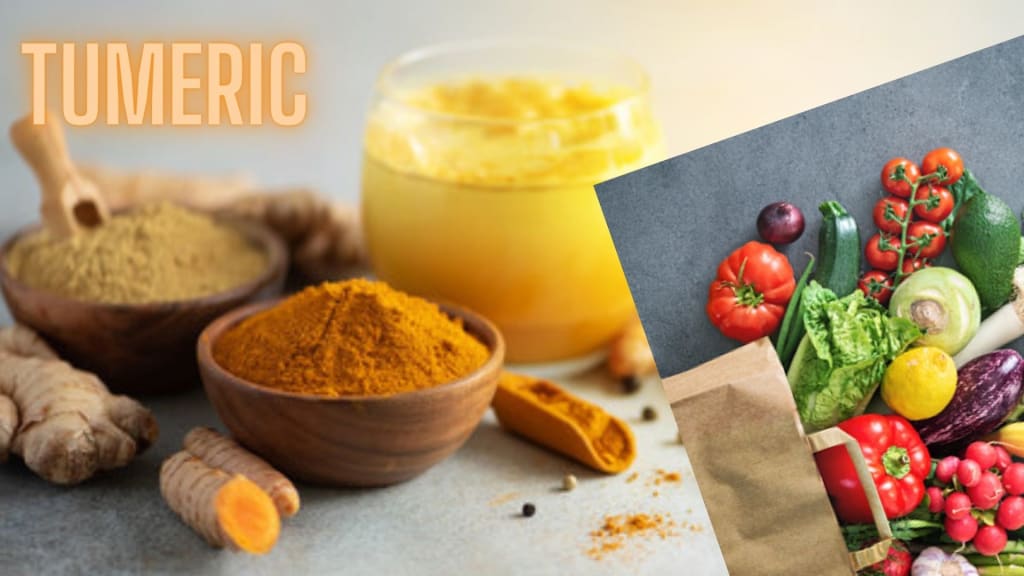The Healing Power of Turmeric:
Harnessing Nature's Golden Spice

Introduction
The body can react differently to turmeric due to its active ingredient, curcumin. Studies on curcumin's possible health advantages have revealed that it possesses anti-inflammatory, antioxidant, and anticancer qualities. Although turmeric has been used in traditional medicine for many years, it is crucial to remember that more research is still needed to properly understand how it affects the human body.
Here are some possible consequences that turmeric use, whether in supplement or powder form, may have on your body:
Anti-Inflammatory Effects: Turmeric contains compounds that can help reduce inflammation in the body. Chronic inflammation has been linked to various diseases such as heart disease, cancer, and diabetes. Curcumin in turmeric has shown the ability to inhibit certain molecules involved in inflammation, potentially leading to reduced inflammation levels in the body.
Antioxidant Activity: Turmeric has antioxidant properties, which means it can help protect cells from damage caused by free radicals. Free radicals are unstable molecules that can contribute to aging and various diseases. Antioxidants help neutralize these free radicals and prevent oxidative stress.
Potential Pain Relief: Some studies suggest that curcumin may help alleviate pain, especially in conditions like arthritis. It is believed to work by reducing inflammation and inhibiting certain enzymes that are involved in pain perception.
Digestive Health: Turmeric has traditionally been used to support digestive health. It may help stimulate the production of bile, which aids in the digestion of fats. Additionally, it can potentially help reduce symptoms of digestive disorders such as bloating and gas.
Brain Health: Curcumin has shown promising results in laboratory studies for its potential neuro protective effects. It may help protect against age-related cognitive decline and neurological disorders by reducing inflammation and oxidative stress in the brain.
Heart Health: Turmeric may have beneficial effects on heart health. It has been suggested that curcumin can help improve endothelial function, which is crucial for a healthy cardiovascular system. Additionally, it may help reduce cholesterol levels and prevent the oxidation of LDL (bad) cholesterol, which can contribute to the development of heart disease.
Potential Cancer Prevention: Some studies have indicated that curcumin might have anticancer properties. It can potentially inhibit the growth of cancer cells, block the formation of new blood vessels in tumors (angiogenesis), and induce cancer cell death. However, more research is needed to understand the full extent of its anticancer effects.
It is worth noting that the bioavailability of curcumin in turmeric is relatively low. To enhance its absorption, it is often recommended to consume turmeric with black pepper or a source of fat, such as olive oil. Piperine, a compound found in black pepper, can increase the bio availability of curcumin, while fats can aid its absorption in the digestive system.
While turmeric and curcumin have shown promise in scientific studies, it is essential to consult with a healthcare professional before starting any new supplement regimen, especially if you have any underlying health conditions or are taking medications. They can provide personalized advice based on your specific needs and circumstances.
Turmeric has gained attention for its potential benefits in preventing and treating Alzheimer's disease. Here are some key points:
Curcumin, the active compound in turmeric, has shown promising neuro
protective properties. It can cross the blood-brain barrier and has been found to reduce oxidative damage, inflammation, and the formation of beta-amyloid plaques—hallmarks of Alzheimer's disease.
Research studies, including both in vitro and animal models, have suggested that curcumin may help prevent the onset and progression of Alzheimer's disease by inhibiting the accumulation of beta-amyloid plaques and reducing neuro inflammation.
Curcumin has been found to enhance the clearance of beta-amyloid plaques by promoting their breakdown and reducing their aggregation. It may also help prevent the formation of new plaques.
In addition to its anti-inflammatory and antioxidant properties, curcumin has shown potential in improving cognitive function and memory. It may enhance brain-derived neurotrophic factor (BDNF), a protein involved in neuronal survival, and promote neurogenesis (the growth of new neurons) in certain brain regions.
While there is promising evidence from laboratory and animal studies, clinical trials in humans have shown mixed results. The limited bioavailability of curcumin and its rapid metabolism in the body pose challenges for its effective use. Researchers are exploring various strategies to improve its absorption and retention in the brain.
It's important to note that while turmeric and its active compound curcumin hold promise in Alzheimer's research, further studies are needed to determine optimal dosage, bioavailability, and long-term effects. Consulting with a healthcare professional is always recommended before using turmeric or curcumin as a treatment for Alzheimer's disease
In conclusion, turmeric, particularly its active compound curcumin, has been associated with various potential health benefits. However, it is important to approach these claims with a critical mindset and rely on scientific evidence. Incorporating turmeric into a balanced diet, combined with an overall healthy lifestyle, may contribute positively to your well-being, but it should not be considered a magical solution for all health issues.





Comments
There are no comments for this story
Be the first to respond and start the conversation.